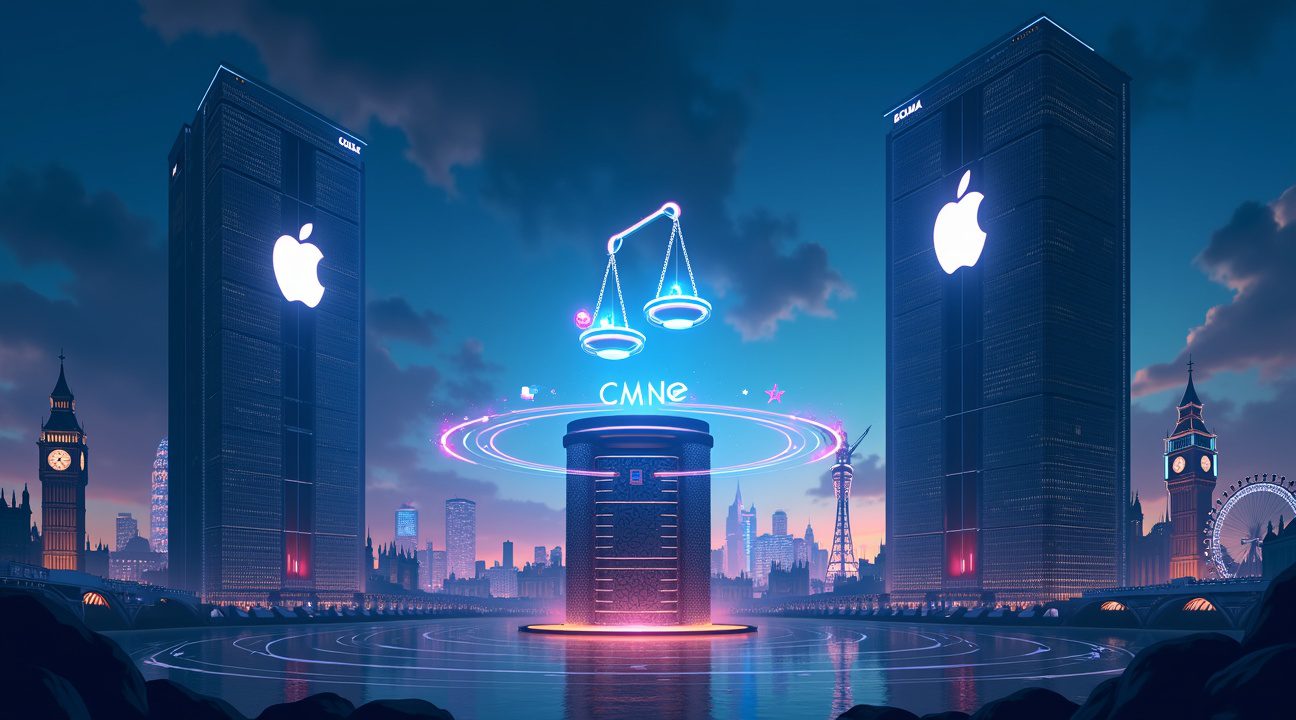UK Targets Apple and Google With Strategic Market Status Designations
The UK’s Competition and Markets Authority (CMA) has proposed granting Apple and Google “strategic market status” under new digital markets legislation, a move that could reshape their mobile ecosystems before the October 2025 compliance deadline.
Key Takeaways
- The CMA’s designation applies to Apple’s iOS and Google’s Android platforms, giving the regulator new powers to impose binding conduct requirements.
- Apple and Google dominate UK mobile markets, with Apple’s Safari browser holding 80–90% share on iOS, and Google’s Chrome owning 70–80% on Android devices.
- Regulatory focus areas include commission fees, proprietary payment systems, app reviews, and restricting developer access to certain device functions.
- Both companies oppose the rules, citing privacy and security, while Epic Games demands even broader reforms like third-party app store access.
- The October 2025 deadline coincides with global efforts, including the EU’s Digital Markets Act, creating worldwide pressure on dominant platforms.
Increasing Regulatory Pressure on Platform Giants
The proposed designations represent the first major test of the United Kingdom’s digital competition framework. According to regulators, Apple and Google exercise disproportionate control over their ecosystems, limiting innovation and consumer choice.
Apple’s App Store and Safari Browser Under Scrutiny
Apple faces criticism over App Store policies requiring developers to use its payment systems—with commissions reaching 30%—and its restriction of browser engines on iOS devices. Critics, including [Epic Games](https://www.epicgames.com/), claim these tactics lock out competition and reduce consumer options.
Google’s Chrome and Play Store Face Similar Oversight
Despite Android’s open-source foundation, the CMA notes tight integration between Google services and hardware. The mandatory installation of Chrome and the Play Store, as well as Google’s control of advertising pipelines, invites regulatory examination.
Industry Reactions Vary Widely
- Apple and Google defend current policies by citing user safety, secure ecosystems, and seamless performance across devices.
- Epic Games supports deeper reforms, such as eliminating commission fees and enforcing access for third-party app stores.
- Consumer advocacy groups largely welcome the proposals, claiming these measures will support affordability and service growth.
- Business representatives offer mixed views, praising competitive policies while voicing concerns about compliance complexity.
Legal Battles Loom Over Implementation
The CMA’s proposal includes granting legal authority to impose specific behavior mandates. Firms designated with strategic market status must meet operational requirements or risk heavy financial penalties. Analysts forecast prolonged legal challenges from Apple and Google, potentially delaying the October 2025 deadline.
Broader Global Impact
Observers note that the implementation of these UK policies parallels enforcement timelines in the EU through its Digital Markets Act. The UK could serve as a model for similar regulatory shifts in North America and other markets.
Developers and Markets Respond
Many app developers are cautiously optimistic. The possibility of reduced commission fees and enhanced access to device functionalities could shift competitive dynamics. App Store and Play Store commissions currently produce billions in annual revenue, raising further concerns within financial markets about potential income loss.
The Road Ahead
The year-long consultation and review process in 2025 will be crucial for determining the final outcome. Stakeholders across the industry are engaged in evidence submissions and feedback as regulators work to finalize enforcement guidelines. Regardless of outcome, the decisions made under this initiative will help define the direction of global platform regulation over the next decade.
CMA Targets Apple and Google with New “Strategic Market Status” Under Digital Markets Regime
I’ve witnessed the UK’s Competition and Markets Authority take a decisive step against tech giants by proposing to designate Apple and Google with “strategic market status” for their mobile ecosystems. This landmark move represents the first major test of the UK’s new digital markets legislation, which officially came into force in January 2025.
The CMA’s proposal specifically targets Apple’s iOS ecosystem and Google’s Android platform, recognizing these companies hold substantial market power that potentially stifles competition. Under the new regulatory framework, this SMS designation would grant the CMA unprecedented authority to impose binding “Conduct Requirements” on both companies.
These proposed rules aren’t arbitrary restrictions but carefully crafted measures designed to address specific competitive concerns. The CMA has identified that both Apple and Google maintain strong positions in their respective mobile operating systems, app stores, and related services that create barriers for competitors and limit consumer choice.
Timeline and Implementation Process
The designation process follows a structured timeline that ensures thorough scrutiny before implementation. Currently, the CMA is conducting a public consultation on these draft designations, allowing industry stakeholders, competitors, and consumers to provide input on the proposed measures.
Key milestones in this regulatory process include:
- Consultation period running through 2025 to gather stakeholder feedback
- Detailed assessment of market power evidence and competitive impacts
- Final designation decision scheduled for October 2025
- First wave of targeted interventions potentially beginning in autumn 2025
I find this timeline particularly significant because it provides adequate time for both companies to prepare for potential changes while ensuring the CMA can implement effective measures. The consultation process demonstrates the authority’s commitment to evidence-based decision-making rather than rushed regulatory action.
Should the designations proceed as expected, the CMA will gain substantial powers to reshape how Apple and Google operate their mobile platforms. These powers extend beyond traditional competition enforcement, allowing the authority to proactively address market dominance before problems become entrenched.
The strategic market status designation would apply specifically to mobile browsers, cloud gaming services, and mobile app distribution – areas where both companies currently maintain strong positions. This focus reflects the CMA’s recognition that these services form critical gateways for digital commerce and innovation.
Similar regulatory initiatives are unfolding globally, with the European Union’s Digital Markets Act already imposing requirements on designated “gatekeepers.” However, the UK’s approach differs in its specific focus on mobile ecosystems and its emphasis on conduct requirements rather than structural remedies.
I anticipate this designation will trigger significant changes in how both companies structure their mobile offerings. The regulatory pressure mirrors other recent challenges, such as financial penalties Apple faces in various jurisdictions and substantial fines imposed on Google for anticompetitive practices.
The CMA’s action represents part of a broader global trend of increased scrutiny on big tech companies. Recent developments include legal challenges Apple confronts across multiple fronts and concerns about algorithmic bias in Google’s services.
This regulatory intervention could fundamentally alter the competitive landscape for mobile services in the UK. Small developers, alternative app stores, and competing browsers may gain new opportunities to challenge Apple and Google’s dominance. The changes could also affect how consumers access apps, browse the web, and use cloud-based gaming services on their mobile devices.
The success of this initiative will likely influence similar regulatory approaches in other jurisdictions, making the UK a testing ground for next-generation digital market regulation. Both companies will need to adapt their strategies to comply with new requirements while maintaining their competitive positions in this crucial market.

Apple and Google’s Stranglehold on UK Mobile Market Revealed
The mobile landscape in the United Kingdom presents a striking picture of market concentration that would concern any regulator examining competitive dynamics. I observe that nearly every adult in the UK carries a mobile device, with an astounding 90-100% of these running exclusively on platforms controlled by either Apple or Google.
This duopoly extends far beyond simple operating systems. Both tech giants maintain comprehensive control over three critical components that define the mobile experience: the underlying operating system architecture, the app distribution mechanisms through their respective stores, and the browser technologies that users rely on for internet access. This integrated approach creates what regulators describe as ecosystem lock-in, making it extremely difficult for users to switch between platforms or for competitors to gain meaningful market entry.
Browser Market Concentration Amplifies Platform Control
The browser segment reveals perhaps the most dramatic illustration of this market dominance. Apple’s Safari browser commands an overwhelming 80-90% market share specifically on Apple devices within the UK market. This figure becomes particularly significant when considering Apple’s strict policies that essentially force all browsers on iOS to use Safari’s WebKit engine, regardless of their brand name.
Meanwhile, Google’s Chrome browser maintains control over 70-80% of the Android browser market in the UK. This concentration in browser usage demonstrates how platform owners leverage their control over hardware and operating systems to direct user behavior in adjacent markets. Chrome’s dominance on Android devices isn’t accidental – it comes pre-installed and deeply integrated into Google’s services ecosystem.
The implications of this browser concentration extend beyond simple user preference. These browsers serve as gateways to the internet, collecting vast amounts of user data and influencing which websites and services users can access effectively. When search algorithms favor certain content, the combination of browser and search control creates powerful leverage over information flow.
Recent regulatory actions worldwide suggest that authorities are taking notice of these concentration issues. Google has faced significant fines in various jurisdictions for anticompetitive practices, while Apple has encountered substantial penalties for similar concerns.
The limited competition in the UK mobile browser segment reveals deeper structural issues within the mobile ecosystem. Users find themselves locked into browser choices that their device manufacturer has predetermined, rather than making truly independent decisions based on performance or features. This arrangement benefits the platform owners by ensuring data collection continues through integrated services, but it raises questions about genuine consumer choice and market competition.
The concentration statistics paint a picture of an ecosystem where two companies have successfully created self-reinforcing competitive advantages. Each component of their mobile platforms – operating system, app store, and browser – strengthens their position in the others. This integration makes it challenging for alternative browsers, operating systems, or app distribution methods to gain traction, even if they offer superior features or user experiences.
Tech innovations from other companies often struggle to find routes to market when platform owners control the distribution channels so completely. The regulatory pressure building in the UK reflects growing concern that this level of market concentration may be stifling innovation and limiting consumer choices in ways that traditional antitrust frameworks weren’t designed to address.
The data from the UK mobile market serves as a compelling case study for regulators worldwide who are grappling with similar concentration issues. The near-universal adoption of mobile devices makes these competitive dynamics particularly important for economic policy, as mobile platforms increasingly serve as essential infrastructure for commerce, communication, and information access across society.

Proposed Rules Target Commission Rates, App Reviews, and Developer Restrictions
The Competition and Markets Authority has crafted specific regulations targeting the core practices that have enabled Apple and Google to maintain their stronghold over the mobile app ecosystem. These proposed rules address multiple interconnected areas that directly impact how developers operate and consumers access mobile applications.
Commission Structure and Payment System Reform
The CMA’s approach focuses on dismantling the financial barriers that currently limit developer freedom and consumer choice. Key areas under scrutiny include:
- Commission rates for in-app purchases, which currently reach up to 30% for both Apple’s App Store and Google Play Store
- Mandatory use of proprietary payment systems that prevent developers from offering alternative payment methods
- Requirements forcing developers to use platform-specific billing systems regardless of cost-effectiveness
- Restrictions on developers’ ability to inform users about cheaper payment options outside the app stores
App review and ranking processes represent another critical area where the CMA is pushing for transparency and fairness. Current systems allow both companies to exercise significant control over which apps gain visibility and success. The proposed rules would require:
- Clearer criteria for app approval
- More transparent ranking algorithms
- Faster resolution of developer disputes
Developer access to device technologies has become increasingly restricted, creating artificial limitations that favor first-party applications. The CMA recognizes that Apple and Google often reserve advanced features for their own apps while limiting third-party developers’ access to similar capabilities. This practice stifles innovation and prevents smaller companies from competing effectively.
Default settings present another avenue where market power manifests in subtle but powerful ways. Both platforms preinstall their own apps and services, making them the default choice for users who rarely change these settings. The CMA’s proposals would:
- Require clearer options for users to select alternative services
- Potentially mandate choice screens for key app categories
Alternative app stores and third-party payment systems could fundamentally reshape the mobile ecosystem if implemented properly. Currently, iOS users have no option to install apps outside Apple’s App Store, while Android users face significant barriers when attempting to use alternative stores. The proposed changes would create pathways for legitimate competition, similar to how the European Union’s Digital Markets Act has begun forcing changes in these markets.
These regulatory efforts aim to address concerns that have been building for years among developers, businesses, and competition authorities worldwide. Apple has faced significant fines in other jurisdictions for similar practices, indicating a global shift in how regulators view big tech market dominance.
The financial impact of these changes could be substantial for both companies. Commission rates represent billions in annual revenue for Apple and Google, while their control over app distribution and payment systems creates additional revenue streams through data collection and user lock-in effects. However, reduced commissions and increased competition could benefit developers by allowing them to invest more in app development and potentially offer lower prices to consumers.
Implementation timeline remains uncertain, as both Apple and Google are likely to challenge these proposals through legal channels. Previous regulatory efforts have shown that tech giants often employ delay tactics while simultaneously making minimal changes to appear compliant. The CMA will need to maintain pressure and provide clear enforcement mechanisms to ensure meaningful change occurs.
Consumer benefits could include lower app prices, improved app quality through increased competition, and greater choice in both apps and payment methods. Businesses would gain more negotiating power with platform holders and could develop innovative services without artificial restrictions imposed by current gatekeepers.
The success of these proposed rules depends heavily on their specific implementation details and the CMA’s willingness to enforce them rigorously. Half-measures or weak enforcement could allow Apple and Google to maintain their market advantages through technical compliance that doesn’t address the underlying competitive concerns.
Apple and Google Fight Back While Epic Games Demands Tougher Action
Both tech giants aren’t quietly accepting the CMA’s draft proposals. Their responses reveal deep concerns about fundamental changes to their carefully constructed mobile ecosystems and business models.
Tech Giants’ Strong Opposition
Apple has mounted a particularly fierce defense, centering their arguments on user protection and system integrity. The company warns that broader third-party access could compromise the security framework they’ve built over years. Apple’s engineers point to potential vulnerabilities that might emerge when alternative app stores gain access to iOS systems, arguing that their current walled-garden approach provides essential safeguards against malware and malicious applications.
Google faces similar pressures but approaches the opposition differently. While Android already permits sideloading applications, the search giant worries about mandated changes that could undermine their Play Store’s competitive advantages. Multi-million fines from various regulatory bodies have already demonstrated the financial stakes involved in these regulatory battles.
Privacy concerns feature prominently in Apple’s counterarguments. The company emphasizes how alternative app distribution methods might bypass their privacy controls and user consent mechanisms. Apple’s executives argue that forcing open their platform could create security gaps that bad actors might exploit, potentially exposing millions of users to data breaches or unauthorized surveillance.
Epic Games Pushes for Stricter Measures
Epic Games CEO Tim Sweeney takes an entirely different stance, criticizing the CMA’s proposals as insufficient. Sweeney argues that current measures don’t address the core monopolistic practices that prevent fair competition in mobile app distribution. His company specifically demands mandatory availability of alternative app stores, including the Epic Games Store, on both iOS and Android platforms.
Epic’s position stems from their ongoing legal battles with both Apple and Google over app store commissions and payment processing requirements. The gaming company contends that without forced access to alternative distribution channels, developers remain trapped in systems that extract excessive fees and limit innovation. Sweeney emphasizes that voluntary compliance won’t achieve meaningful market competition.
The gaming giant’s demands extend beyond simple app store access. Epic wants comprehensive changes that would allow developers to bypass platform holders’ payment systems entirely, eliminating the 15-30% commissions that have become industry standard. This position reflects broader developer frustrations with current mobile platform economics.
Epic’s advocacy carries weight given their success in challenging existing structures. Their legal victories in some jurisdictions and continued pressure have already forced some changes in how app stores operate. However, the company maintains that piecemeal adjustments won’t create truly competitive markets.
The regulatory timeline adds another layer of complexity to these competing positions. Updated roadmaps scheduled for the first half of 2026 will incorporate stakeholder feedback and consider international regulatory trends. This extended timeframe gives all parties room to refine their arguments and potentially find middle ground.
International coordination becomes increasingly important as different jurisdictions pursue varying approaches to digital market regulation. The CMA’s decisions will likely influence similar regulatory efforts across Europe and beyond, making the stakes even higher for all involved parties.
Companies like Microsoft and Google watch these developments carefully, knowing that precedents set in mobile markets might extend to other digital platforms. The regulatory landscape continues evolving as governments worldwide grapple with balancing innovation, competition, and platform control.
Further stakeholder engagement promises to intensify these debates. Consumer advocacy groups, smaller developers, and enterprise customers all bring different perspectives to the discussion. Each group’s input will shape how regulators balance competing interests and craft final requirements.
The outcome will ultimately determine whether mobile platforms maintain their current structures or undergo fundamental transformations that redistribute power between platform holders and third-party developers.

UK Joins Global Push Against Big Tech Dominance with October 2025 Deadline
I’m witnessing a pivotal moment in tech regulation as the UK sets its sights on Apple and Google’s mobile market dominance. By October 2025, final decisions on platform designations and the first phase of regulatory intervention will reshape how these tech giants operate in British markets.
The UK’s aggressive timeline puts real pressure on both companies to modify their business practices. This deadline isn’t arbitrary—it represents a calculated effort to synchronize with global regulatory movements that are already causing significant disruption. Countries worldwide have recognized that isolated regulatory approaches lack the punch needed to challenge such massive market players.
Coordinated International Enforcement Creates Unprecedented Pressure
The UK’s strategy aligns closely with the EU’s Digital Markets Act, creating a one-two regulatory punch that forces Apple and Google to address market concentration issues across multiple jurisdictions simultaneously. This coordination prevents companies from simply shifting problematic practices between regions, a tactic that previously allowed them to maintain dominance while appearing compliant.
Several key regulatory actions demonstrate this unified approach:
- The EU’s Digital Markets Act has already forced Apple to allow third-party app stores
- Russian authorities have imposed significant penalties on Google for antitrust violations
- Apple faces substantial financial consequences in multiple markets
- US antitrust agencies pursue parallel investigations into both companies’ mobile practices
I observe that this coordinated pressure creates exponential challenges for tech companies. Where previously they could absorb fines or regulatory requirements in one market, the cumulative effect of simultaneous global enforcement makes resistance economically unsustainable.
The October 2025 deadline forces Apple and Google to make fundamental changes rather than superficial adjustments. These tech innovations that once seemed untouchable now face systematic dismantling of their competitive moats.
This global shift represents more than regulatory enforcement—it signals a fundamental change in how governments view platform power. The mobile ecosystem, which has operated under duopoly conditions for over a decade, faces its most serious challenge yet. Companies that have relied on closed ecosystems and proprietary standards must now prepare for increased competition and reduced control over their platforms.
The UK’s approach specifically targets the architectural foundations of mobile market dominance, focusing on interoperability requirements and app distribution methods that could permanently alter the competitive landscape.

Sources:
Politico – “UK moves to force rules on Apple and Google app stores”
TechCrunch – “UK targets Apple’s and Google’s mobile platforms for regulation”
Competition and Markets Authority (CMA) blog – “CMA proposes next steps for improving mobile platforms in the UK”
Bloomberg – “Apple, Google Face Tougher UK Rules to Rein In Mobile Platforms”


